On September 2nd, PPC marketers were met with an unforeseen memo in Google Ads:
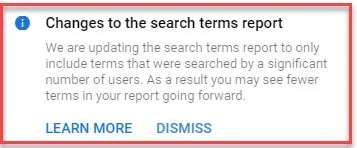
This tiny notice was all that was provided by Google to inform users of a major change in their reporting. PPC advertisers across the board had no prior knowledge of the change, meaning all of a sudden their insights into their ad campaigns were drastically reduced – with nothing to be done about it.
What Has Google Gone and Done Now?
It has transpired that Google’s notice means that any search terms people have used to trigger your ads, which Google deems to have a ‘low volume’ of search, will no longer appear in your report. Even if they have led to a click or a conversion.
Before now, Google’s Search Terms Report (or Search Query Reports (SQRs), as they’re often referred as), would display details of every single search term that someone entered that triggered your advert, if it gained a click. Now, a huge number of these will be missing from the report, unless they meet the threshold of Google’s ‘significant number’ – a number that is yet to be defined.
This level of reduced visibility, although arguably portrayed by Google to be fairly inconsequential, is actually likely to have a significant effect on many online advertisers – particularly those in niche sectors that rely on longtail search terms to generate conversions and sales.
We take a closer look at the real effects that this change is having, why Google has made the update, and what it means for advertisers.
What Percentage of Data is Hidden from Search Term Reports?
The update came into effect on 1st September, and then came to light on 2nd September. As a PPC agency, we are already seeing the effects across all our clients’ advertising.
We work with a range of businesses in all kinds of sectors and have noticed that, on average, there has been a 34% drop in visibility in their Search Terms Reports. Most accounts sit in the range of between 25 and 45% budget spend that is now invisible. These are the results looking at just five days’ worth of data. This reveals that Google’s seemingly minor change will, in actual fact, have a huge impact on many companies’ PPC advertising.
Looking closer at each clients’ report, our expectations regarding which accounts will be the worst affected have become evident. Technical companies that rely on the longtail search terms almost entirely, have seen a significant reduction. For example, one of our more technical clients, that operates within the scientific industry, has lost visibility of around 46% of their data. This will greatly impact how their campaigns are orchestrated going forwards.
We’ve taken a sample of 15 random clients, to take a closer look at the effects of the change:
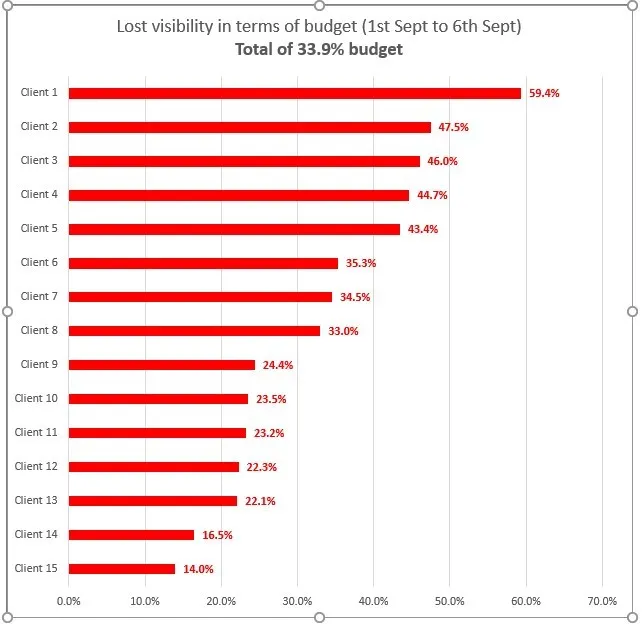
Before now these kinds of companies had broad visibility over their advertising campaigns, and precisely what terms people were entering into Google to find them. This is no longer the case, because the Search Terms Report omits all ‘low volume’ search terms.
It’s important to note that it’s not only clicks that are no longer visible, it’s conversions too. That means you won’t even be able to see all the search queries that end up generating sales and enquiries.
Why Does This Matter?
The reason why this is a problem is because of the changes to how PPC advertisers will be able to use search term reports going forwards. Having access to 100% of data regarding search terms, clicks and conversions, PPC advertisers have been able to thoroughly optimise their campaigns as necessary – until now. Primarily, this meant using every single term given to inform negative keywords, new keyword ideas, and regular optimisation.
Defining negative keywords
Advertisers will no longer see exactly where their ad spend is going, and it could well be being spent on irrelevant search terms. Before now, if a PPC advertiser identified a search term that led to a click, but that is not relevant to their campaign, this search term can be added to their list of negative keywords. This would then ensure that budget is not being spent on ads appearing for this term moving forward. No longer having access to 100% of search query data will make it even more difficult to determine the negative keywords, which could result in budget being wasted.
Another benefit of identifying and defining negative keywords is that terms can be applied across a wider scope of keywords. For example, if the term ‘free car servicing’ appeared in your Search Terms Report, you could decide not only to declare this term as negative, but also all other terms that include the word ‘free’.
Identifying new keywords
Another way that visibility over low volume search terms has benefited PPC advertisers is in the identification of potential new terms to optimise towards. Especially when a large report covering a wide date range is run, it’s possible to identify 100 instances of just one search (for example), which would indicate that it might be worthwhile to take a closer look at the term. If it’s determined to be relevant, and potentially lucrative, ad copy, landing pages, and the overall campaign messaging can be updated to suit.
The reduction in information offered in the report means that PPC advertisers are not privy to the same data anymore; the data which would ordinarily go on to inform their choices regarding choosing which terms to bid on.
Why is Google Hiding Search Terms?
Google have claimed that the reason for this change in reporting is due to privacy concerns;
“In order to maintain our standards of privacy and strengthen our protections around user data, we have made changes to our Search Terms Report to only include terms that a significant number of users searched for. We’re continuing to invest in new and efficient ways to share insights that enable advertisers to make critical business decisions.”
This statement has caused upset among marketers, however, who feel that this is an over-used excuse that only masks the real reason; the goal of increasing advertisers’ spend with Google.
The fact is, having less visibility over low volume search terms means that PPC advertisers have little choice but to bid on broader and more competitive terms. This means that there will be less efficiency in the way that PPC budget gets spent – particularly for those advertisers who do not have the skill and expertise to counteract the problem.
Google’s true intent
Many marketers feel that the changes to the Search Terms Report are in keeping with Google’s behaviour over recent years; that of gradually removing control from advertisers.
Another example of this is that Google have altered ‘exact match keywords’ to mean something else entirely (more about this in our blog: Are Close Variant Keywords Wasting Your Budget?). Again, when these changes occurred, PPC marketers had to adapt their approach accordingly. Instead of focussing on precisely which terms work for them, advertisers need to look closer at their negative keywords, so they can rule out those that don’t work. With this information, advertisers have – to a point – been able to limit how much budget gets mis-spent on the keywords that don’t work. Thorough visibility within Google’s Search Terms Report has been imperative to this process.
A commonly suggested reason for such changes is simply for Google to create more competition between advertisers and make more money in doing so. Which is precisely what’s being said in reaction to the recent reporting update;

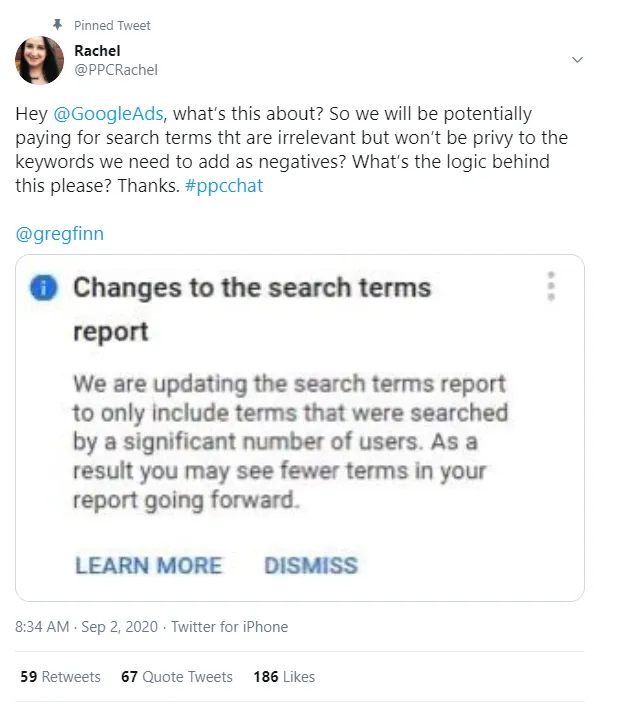
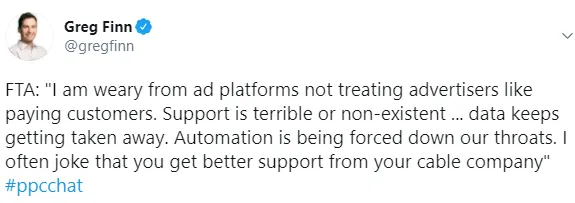
Google, like many businesses in recent months, has seen a drastic drop in spend due to the impacts of coronavirus. A huge portion of PPC advertisers have been forced to cut their budgets with Google, and it’s been reported that this led to a 10% drop in their revenue growth. Because of this, many PPC professionals feel that the changes to the Search Terms Report information is in fact an attempt to reclaim some of the ad revenue that was lost.
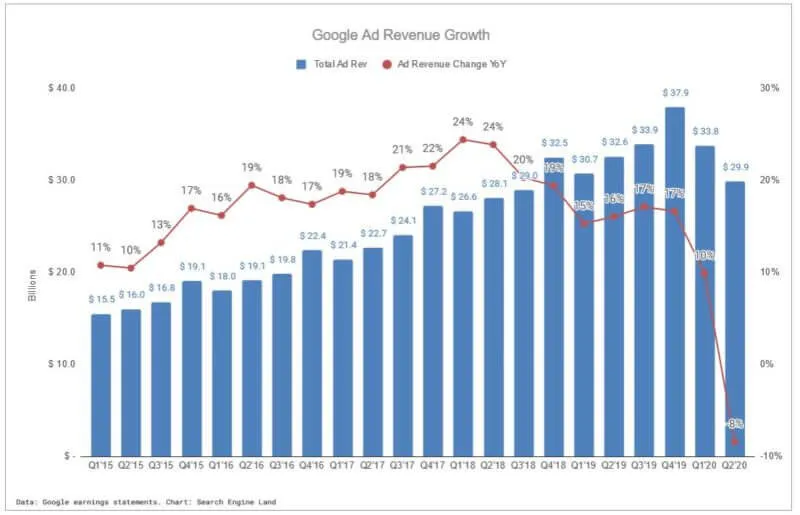
How Will The Google Search Term Report Update Affect PPC?
For many businesses, the reduction in search term visibility will certainly impact how PPC advertising campaigns are run. Ultimately, we can expect advertisers to face an increase in Cost per Conversion, because budget can no longer be spent so specifically. This means that advertisers may need to spend more overall in order to achieve the same results.
The fact is that – for good or for bad – Google has the power to enforce these changes, giving PPC marketers no choice but to adapt accordingly. For advertisers like us, this means getting more creative with our strategies, and finding new ways to collect and use the data required to achieve the high standard of performance that we win for our clients.
Fortunately, there are multiple routes to choose from to help maintain effective PPC advertising, even in light of these changes. Skilled PPC professionals have many tricks up their sleeve to do just this.
Who will be affected the most?
While just about every business that uses PPC advertising will likely suffer from this reduced visibility of their data, there are certainly some advertisers who will be more negatively impacted than others. In understanding the types of advertisers that rely on the granular information that will no longer be displayed, it’s likely that those who will be worst affected are likely to include:
- Those with new PPC accounts, that have no historical data to work with
- Those operating in niche sectors, that rely on longtail or technical search terms
- Smaller advertisers who don’t have the skills, knowledge, and access to data to effectively counteract the change
If your company fits any of these descriptions, you need to be thinking about what you can do to solve the problem. Get in touch with MRS today to find out how we could help.
What This Means for Our Clients
At MRS, our expert PPC team are well-versed in adapting as necessary, according to the demand of ever-changing obstacles thrown up by Google. We know how to develop PPC campaigns in line with wider changes and have a long history of continuously delivering results for our PPC clients. Ultimately, our clients know that their PPC advertising is in safe hands.
In regard to this latest development, the fact is, for established clients we will continue to have access to plenty of historical data. We’ve reaped all the benefits of the original, broad Search Terms Reports until now, which will continue to inform our PPC campaign approach.
To reduce the negative impact of Google’s reporting changes, we are already implementing a range of methods, including the following.
Changes to negative keyword management
One way that we’ll keep making ad campaigns working hard is to pre-empt negative keywords, rather than rely on the Search Terms Report to provide this information. We’ll keep a close eye on the information we do have access to and try to think of potential close variant keywords that would have zero conversions. An example of this would be the use of ‘IT services’ instead of ‘IT support’. Drawing on a wealth of experience, we’ll look for anything that Google might consider to be a synonym, when in truth the user is looking for something specific; one or the other.
Use the information provided on Bing’s search query report
While there’s no denying that Google all but runs the world of search, Bing still shares a good proportion of the market. This means that the information this search engine can provide will still be very helpful. Before now, the data trends that can be seen on both Google and Bing’s reporting have been similar, so much of which applies to Bing advertising can continue to be applied to Google advertising.
Use data obtained from SEO marketing
In addition to our PPC marketing, our SEO marketing methods are very data driven. While these two areas of digital marketing are substantially different, we can still use keyword research carried out for SEO purposes, to inform our PPC strategies. A good example of this is the use of Google Search Console, which can be used to identify the precise search terms a user has input, that has triggered a search result. In this way, the visibility of real-life search terms informs our content creation, as it would inform our PPC advertisements. We will use a combination of information from various data sources such as this, to keep creating PPC ads that deliver.
If the recent Google Search Terms Report changes are a concern for you, or you have any questions regarding how to effectively run PPC now, get in touch to find out how we can help. Whether this be through altering your PPC campaigns, or exploring other areas of digital marketing, we know how to ensure your budget delivers the sales you need.






